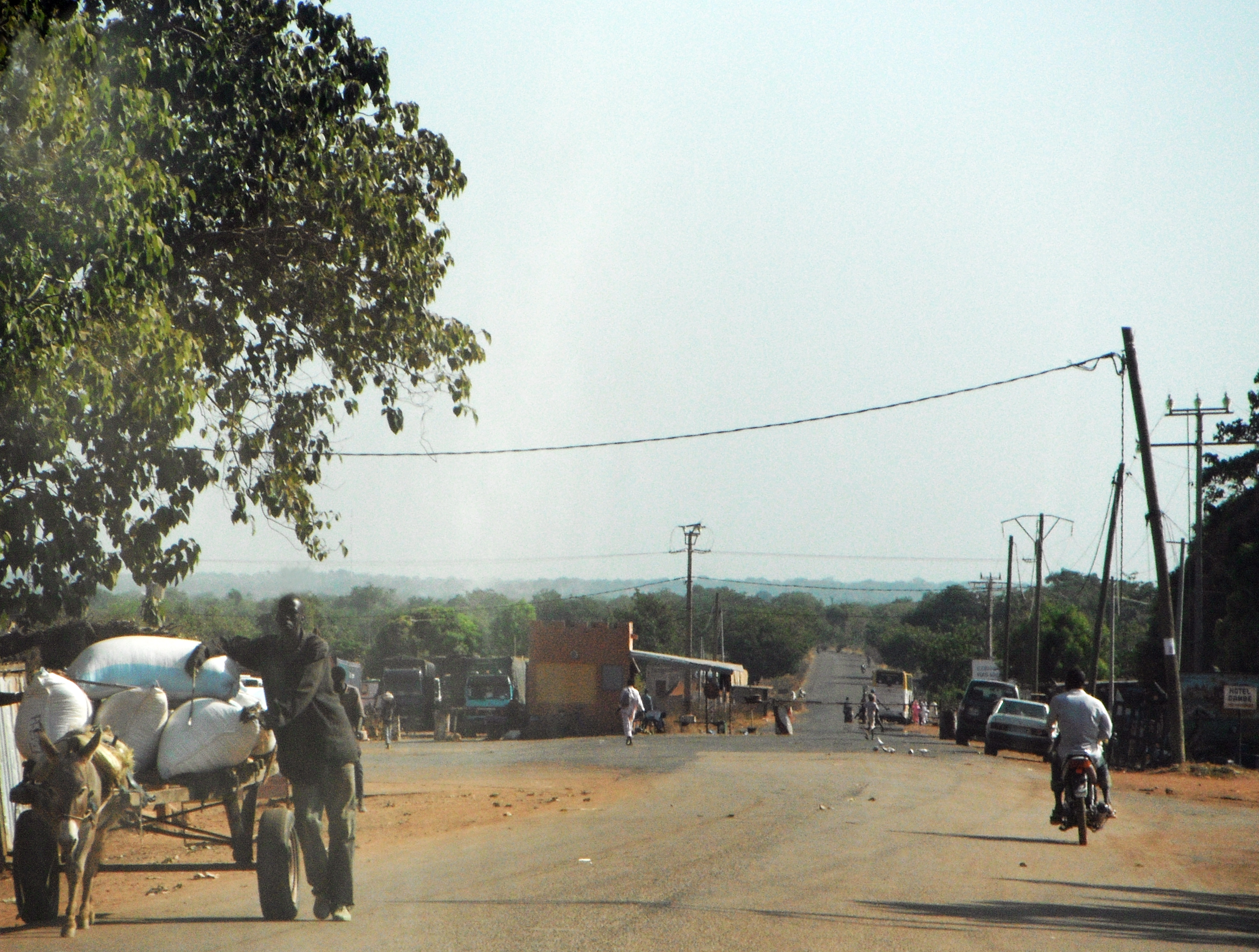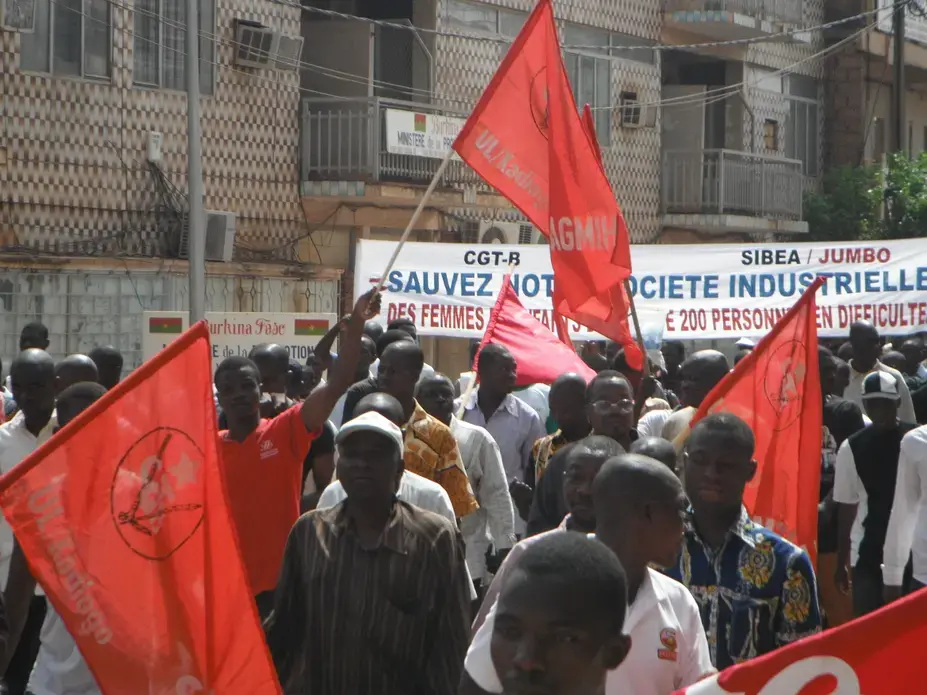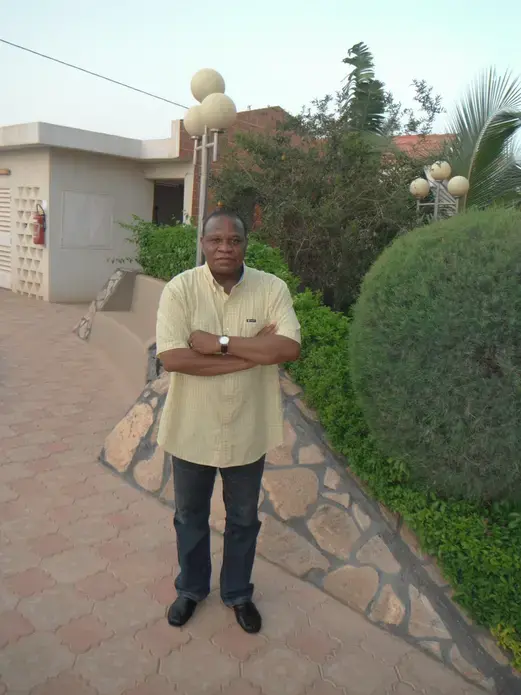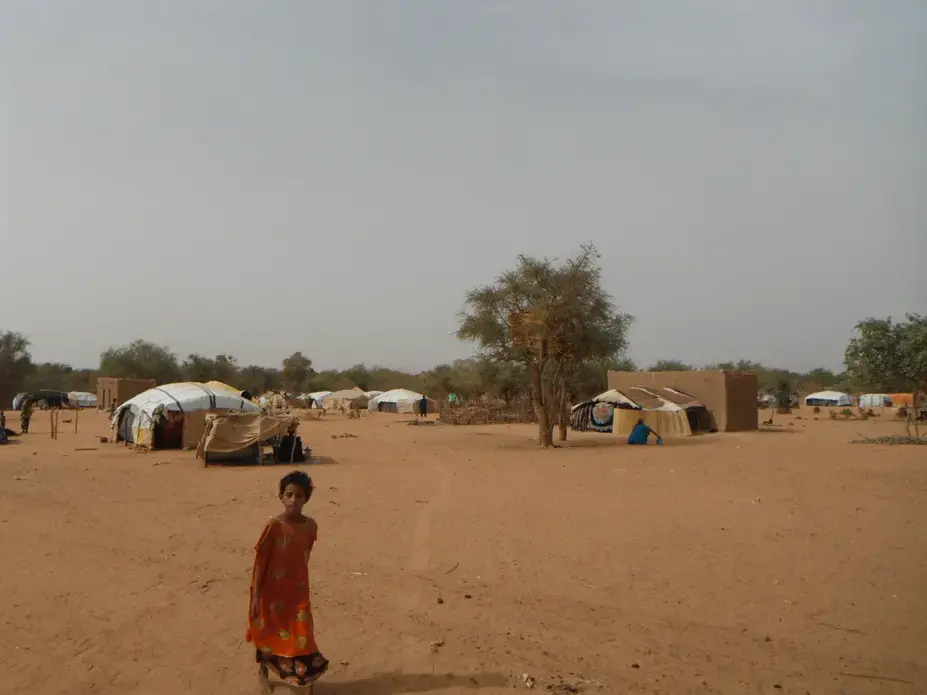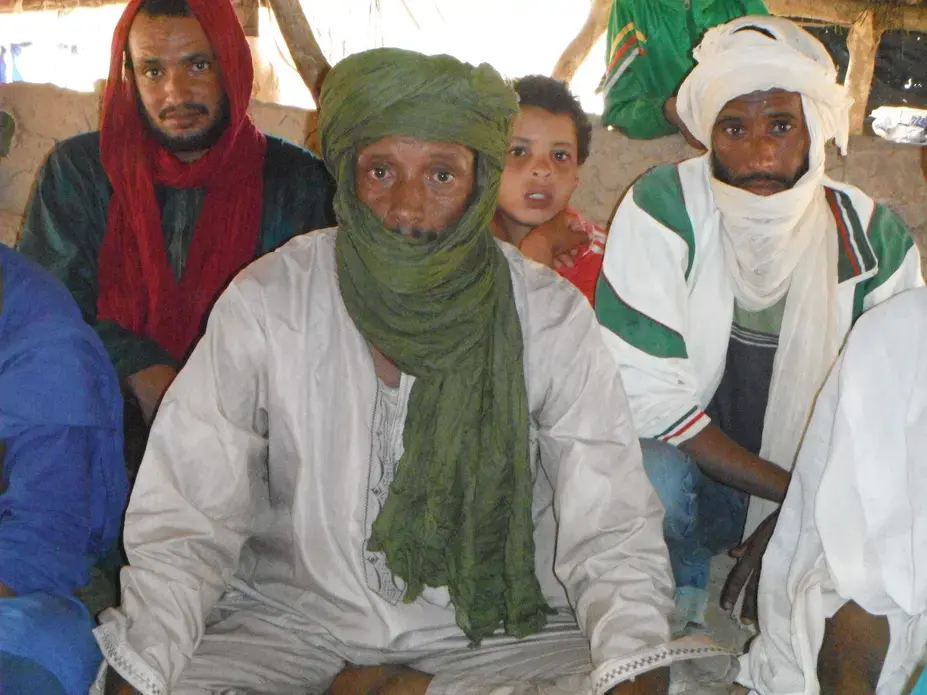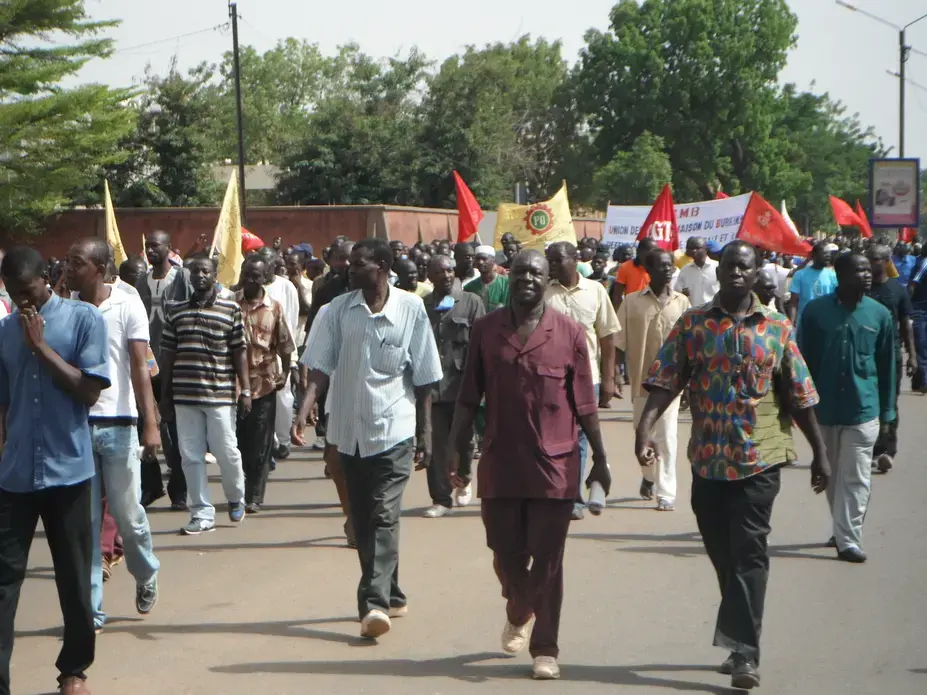Col. Moussa Cisse, spokesman for Burkina Faso's Ministry of Defense, hunched over his desk, cell phone to his ear, scribbling on a pad. It was after 6 p.m. on May 22, 2012, in Ouagadougou, the capital city, and he was just learning about an incident in the country's north: Farmers had attacked cattle herders over land rights, a common conflict on the sun-washed lands of the West African Sahel, where good soil and grass are scarce. Except in this case an international border fell between combatants. Cattle belonging to ethnic Fulani herders from Burkina Faso had trampled crops of Dogon farmers across the border in Mali. Dozens of people were dead, mostly Fulani men, Cisse told me. Preliminary news reports spoke of hundreds of Fulani fleeing Mali and burnt bodies found in the bush.
But Burkinabe officials coping with the crisis had a more pressing problem. "We don't know what officials we can talk to in the [border] area." Cisse said, referring to Mali, where civil war had recently split the country between north and south. The region where the farmer-versus-herder violence erupted is just over the border in northern Mali, where it is unclear who is in charge. Tuareg rebels have declared an independent state in the north, though they are at odds with Islamist rebel groups who aim to impose Shariah law across Mali. Both sides have fallen out in gun battles. Northern Mali is itself split between the Islamists who occupy the largest towns—Kidal, Gao, and Timbuktu—and the secular Tuareg nationalists who claim to hold the countryside.
Cisse put down the phone and shook his head. "Let me tell you something," he said. "When your neighbor's house is burning, you'd better take care."
Events in Mali show how quickly things can spin out of control in the most stable of countries. Mali was a model of democracy, a growing center for the arts and the study of African history, but fell apart after a March 21 military coup in Bamako, Mali's capital city, plunged the country into chaos. This happened in the middle of a drought, touching off a refugee crisis that has brought the Sahel region to the brink of famine with more than 300,000 people displaced by the Mali crisis, including some 90,000 in tiny Burkina Faso.
Cisse's proverb underscores Burkina Faso's delicate position in the Sahel, where its larger neighbors—Mali, Niger, and Cote d'Ivoire—have all been shaken in recent years by war and military coups. As a result, Burkina Faso keeps a wary eye on its borders and Mali in particular. The two countries, which share a 600-mile border, have gone to war over less than farmers and herders fighting over land—two wars, in fact, in 1974 and 1985, over a poorly defined stretch of border called the Agacher strip, 70 miles north of where May's violence occurred.
The Agacher strip is a piece of desert about 100 miles long, reportedly rich in minerals, though such claims have not panned out. The first war amounted to an exchange of small-arms fire over a few weeks. The second, the "Christmas War," was fought at the end of December after Burkinabe soldiers entered Malian villages to conduct a census. The Malian army took back the villages along with a few square miles of Burkina Faso. Dozens died in ground clashes and aerial bombings on both sides.
They declared a truce and took their dispute to the World Court. A year later they signed an agreement to settle their differences over the Agacher border area.
But this time, despite the chaos in Mali, Malian and Burkinabe officials needed only two days to issue a joint denunciation of the Dogon-Fulani violence. Still, one senior Western diplomat who asked not to be identified expressed the same frustration as Col. Cisse, spokesman for the defense ministry. Burkinabe officials, the diplomat said, "had some difficulty" finding a Malian official to talk to. Burkina Faso's only other move was to increase patrols along what was a few months ago a stable border.
Finding the right Malians to talk to, however, has not been difficult for Burkina Faso's President Blaise Compaore, chief mediator for the Mali crisis on behalf of ECOWAS, the Economic Community of West African States. Most Western diplomats and Burkinabe officials interviewed for this article asked not to be identified, though they are optimistic about Compaore's prospects for finding peace in Mali. Compaore has been holding talks with rebel groups in the breakaway north and Malian officials while ECOWAS countries have committed 3,000 troops to help Mali retake the north. Mali's government, after balking for months, has agreed to accept the troops with the condition that the national population be educated on their mission in Mali. No timeline has been set for the troops' arrival, though the announcement is an important concession to ECOWAS.
Still, Compaore has a difficult job ahead of him as mediator. Political stalemate in Bamako persists while life in northern Mali deteriorates by the day as Islamist rebels allied with al Qaeda in the Islamic Maghreb tighten their grip. "You can't even call Mali a country any more," said one exasperated Burkinabe diplomat.
But Compaore, who led mediation efforts in the Ivory Coast presidential succession crisis, has proved himself a determined negotiator. His priority in Mali has been to negotiate a timetable for a stable, unified government to establish itself. The stakes are high and at times the task seems impossible. Political stability in Bamako, the senior diplomat explained, "will free up resources to focus on what's happening in the north."
In many northern towns Islamists have arrested and beaten dissidents, shot protesters, and publicly flogged violators of Shariah law. In the towns of Timbuktu and Gao they have launched a campaign to destroy mosques, mausoleums, and historic archives the Islamists accuse people of worshipping above god. In July Islamist officials in the northern town of Aguelhok stoned to death a couple they accused of having children out of wedlock. Days later, on August 7, Compaore dispatched his foreign minister, Djibrill Bassole, to the northern Malian towns of Gao and Kidal. Bassole met with the leaders of the Islamist groups Ansar Dine and the Movement for Unity and Jihad in West Africa and asked them to cut their ties with al Qaeda. The rebels made no promises, but on the surface the visit appeared to produce results when Ansar Dine's chief, Iyad Ag Ghali, pledged his support for Burkina Faso's mediation efforts.
Meanwhile, there is regular traffic between Ouagadougou and Bamako, where the power structure wavers between army officers behind the March coup and an appointed interim civilian prime minister and president. Mali's prime minister, Cheick Modibo Diarra, an astrophysicist who is also an American citizen, visited Compaore in Ouagadougou July 18 to discuss a "road map" for returning Mali to stable civilian rule. But, as if to remind Compaore of the challenge he faces as mediator, Diarra returned to Bamako to demands for his resignation. A group of political party leaders called the United Front for the Defence of the Republic and Democracy accused Diarra of weak leadership and lack of vision.
To make matters worse, political strife in Bamako rivals unrest in the north. There have been no charges against leaders of a May mob attack on the presidential palace. The 70-year-old President Dioncounda Traore suffered serious head injuries, forcing him to seek medical treatment in France. On July 24, Human Rights Watch issued a report warning of the military junta's human rights violations, including the kidnapping and torture of journalists, and the torture and disappearance of 20 soldiers implicated in a failed counter-coup in early May.
The report accuses Capt. Amadou Haya Sanogo, leader of the March coup, of organizing a "campaign of intimidation" against the junta's opponents. "The 20 soldiers whose forcible disappearances were documented by Human Rights Watch are feared dead," the report said. "In July, two journalists were abducted by armed, masked gunmen driving pickup trucks with no license plates, severely beaten, and dumped on the outskirts of Bamako after being warned to stop criticizing the military."
But Burkina Faso, one of the world's poorest countries (number 181, near the bottom, on the U.N. Human Development Index), has its own problems. Last year Compaore survived his worst political crisis since taking power in 1987, a loud and violent challenge from police and army units, including elements of his own presidential guard, as well as teachers and student groups. They rioted in Ouagadougou and other cities over poor pay, corruption, and the high cost of living. The price of rice, for instance, has more than doubled. Compaore briefly fled the capital.
The crisis passed. Police and soldiers stood down. Some diplomats credit Compaore's own political reputation and his promises that he would do something about corruption and salaries. He sacked the officials, including high-ranking police officers, who were the subjects of the strongest corruption allegations. In his new year's address to the nation, Compaore called for a "strengthening of democracy" and a "commitment to live together."
A year later, civil servants, teachers and students continue to protest the cost of living, though demonstrations across the country have been peaceful. On March 25, about 2,000 people carrying signs and shouting slogans marched through Ouagadougou before dispersing in the mid-day heat. Interviews with dozens of protesters revealed discontent with food prices, but not Compaore's leadership.
Burkina Faso retains its image as a small island of stability in a region plagued by drought and war. "People blame the government," a second Western diplomat told me, "but they do not blame Blaise Compaore."
Now, while Burkina Faso struggles to feed its people and cope with Malian refugees in the midst of a drought, Compaore's role as mediator over the Mali conflict cements his position as West Africa's peace broker. Diplomats and Burkinabe journalists see this as a positive, though ironic change of direction for Compaore. "He is trying to change his image," said Germaine Nama, publisher of the Burkinabe news magazine L'Evénement, "but he cannot change the past." Or, as the second diplomat put it, "He realizes that some of his past acts were not what he wanted his legacy to show."
Compaore, who is 60 years old, was an army captain when he rose to power through two coups in the 1980s. The second, in 1987, killed his friend Capt. Thomas Sankara, the Marxist revolutionary who was president and remains an iconic figure, often compared to Che Guevara. It was Sankara who replaced the country's colonial name, Upper Volta, with Burkina Faso, a combination of words in the Moore and Dioula languages, meaning "land of the upright people." Compaore called Sankara's death an "accident," though the circumstances remain unexplained. He has maintained a tight grip on power ever since, quietly sidelining or executing rivals. In another unexplained case, members of his family are suspected in the 1998 killing of a local journalist, Norbert Zongo, who was investigating a murder connected to Compaore's brother, Francois.
Nonetheless, Compaore has built a reputation as a steady, low profile leader, not given to displays of wealth or violence. He is, in the words of western diplomats, a "quiet listener." Despite his rebel past and connections to civil wars in Liberia and Sierra Leone, Compaore is one of the longest serving heads of state in West Africa. Politicians like Alassane Ouattara, president of Cote d'Ivoire, and Niger's President Mahamadou Issoufou have more political experience, not to mention softer records, but they don't have Compaore's years in presidential office.
A former Western ambassador to Burkina Faso, said of Compaore: "He is the most senior political leader in the region who is not a complete bully or a warlord."
Compaore's fourth term as president ends in 2015 and he has not said whether or not he will stand for re-election, which helps explain his change of focus, just in time to alter how history will regard him. He is bound by constitutionally mandated term limits to step down, though his party, the Congress for Democracy and Progress, has in the past swept aside such technicalities to keep Compaore in office.
It's not hard to see why his legacy might worry him. Compaore is, after all, the man who, with the help of Moammar Qaddafi, fueled civil wars in Liberia and Sierra Leone in order to strengthen his own country's regional clout and access to the seacoast. It was Compaore who brought together two of Africa's most notorious figures, Qaddafi and Liberia's former warlord president, Charles Taylor, opening the flow of Libyan arms to Taylor and pushing Liberia into brutal civil war. Then there is his connection to coups in Ivory Coast, Burkina Faso's biggest trading partner with which it shares a 363-mile border. Meddling in the affairs of wealthier nations has been Compaore's strategy for busting his tiny, landlocked and desperately poor country out of the Sahel.
But that side of Compaore's political character, the man who dabbled in war and regional power games, has faded, tempered by Taylor's fall from power, the defeat of rebel groups in Sierra Leone, and the demise of his old friend Qaddafi. Compaore has had more success dealing in peace. Since 2006, he has helped settle political crises in Togo and Guinea, and he played a key role in ending Ivory Coast's ten-year political crisis—a settlement he and Burkina Faso have benefited from.
So as Compaore works through problems in Mali, Burkina Faso is also setting an example elsewhere. The country contributes more than 1,000 personnel—soldiers, police officers, and military observers—to peacekeeping efforts in Sudan, Guinea Bissau, Haiti, Central African Republic, Democratic Republic of the Congo, and Burundi. Last year Foreign Minister Bassole stepped down after four years as the African Union-United Nations mediator for the Darfur crisis in Sudan. Burkina Faso's growing reputation for stability and influence in West Africa is a sharp contrast to its image 20 years ago when it was, in the words of a Malian diplomat, a "bastard country."
Burkina Faso, like Mali, is a former French colony, but one the French neglected. Given its confusing colonial history, the country could be forgiven had it become an unstable failed state, which it hasn't. France re-cut Upper Volta, as Burkina Faso was known before independence, seven times, sectioning off pieces to neighbor colonies. In 1932, France abolished Upper Volta altogether, folding it into Ivory Coast. But in 1947, Paris changed its mind and Upper Volta was reinstated along its former borders. Finally, in 1960, Upper Volta and the rest of French West Africa became countries to the surprise of a vast rural population. Citizens of these colonies had had little contact with the French and the lines they drew, not to mention the new countries of which most were now citizens—Senegal, Mauritania, Mali, Upper Volta, Niger, Benin, Guinea, and Ivory Coast. The French drew the borders on paper, not on the ground, which helps explain the mess that has split Mali. Yet somehow, Burkina Faso has emerged as a nation unique in the Sahel, a place where ethnic and religious strife—even despite conflicts between farmers and herders—do not threaten to tear the country apart.
Burkina Faso's poverty helps explain Compaore's experiments with war and peace. He's been trying, for better or worse, to raise the profile of a country whose main exports are cotton and gold. Burkina Faso is a third the size of Mali and Niger, with about 17 million people. Most are farmers who work some of the driest, most inhospitable soils on earth. Like its two giant Sahelien neighbors, Burkina Faso is landlocked, but all of its six neighbors (Benin, Togo, Ghana, Ivory Coast, Niger and Mali) are blessed with seacoast or great rivers. This means that just to survive, millions of Burkinabe have left their homeland to find work, particularly in richer countries like Ivory Coast. Such flight is true across the Sahel, but Burkinabe love to point out that they more than others built the coffee and cocoa industry of Ivory Coast and the fishing and agricultural industries of the Niger River.
Boreima Badini, a former Minister of Justice who served as Burkina Faso's mediator in the Ivory Coast crisis, says his country has earned a stake in the success and stability of its neighbors. "Our greatest resource," he said in an interview, "is our people."
The question now, for many Burkinabe, is not so much how the country got here, but how it can retain its stability and autonomy. Compaore has tried to address this issue by studying his neighbors' politics and talking both with those in power and in the opposition. Compaore has also earned the suspicion of many West African leaders who witnessed his maneuvering in Ivory Coast, Liberia, and Sierra Leone.
"Compaore was never a disinterested party," said the former ambassador. "He was always playing a double game."
In Ivory Coast, where millions of Burkinabe still live and work, Compaore has had a role in nearly every coup of the last 19 years, ever since the death of Ivory Coast's founding president Houphouet Boigny. But he's had more success in the role of mediator. The game appears to have paid off, for now. Economically Burkina Faso cannot afford to ignore the affairs of its neighbors, especially one like Ivory Coast, its main trading partner whose seaport at Abidjan processes nearly all of Burkina Faso's cotton. Compaore now has unprecedented access to the seat of power in Ivory Coast.
During the last three years of the Ivorian crisis, Compaore sent Badini, his former justice minister, Ivory Coast's economic capital, as resident mediator. Badini shuttled back and forth between then opposition leader, Allassane Ouattara and President Laurent Gbagbo, now a prisoner of the International Criminal Court facing trial on war crimes. Gbagbo publicly accused Compaore of meddling in Ivorian politics by supporting rebel groups against him—an accusation never proven—but privately he accepted Compaore's help in mediating the conflict.
"I let both sides know I was at their disposal at any hour, on any day, and they both used that," said Badini. "Often I was called in to talk by one side or the other in the middle of the night."
Burkina Faso has barely had time to breathe between helping stabilize its southern border with Ivory Coast and the new problems on its western border with Mali. In Ouagadougou, where government and international agencies are hard pressed to find food and water for drought-stricken villages, frustration is great as Malian refugees crowd camps, straining the country's meager resources. Last May's border clash between farmers and herders heightened government and international concern for the safety of Malian refugees on Burkinabe soil. It doesn't help. Burkinabe officials complain, that Mali cannot contribute resources to relieve the refugee problem. "They are completely disorganized and that, of course, is a problem for us," said Felix Kambire, spokesman for Burkina Faso's state security services.
Burkina Faso's Prime Minister, Luc Adolphe Taio, on a tour of refugee camps along the border in April, told refugee leaders: "We are aware that you are living in difficult conditions. But you've come at a moment when our own country is in a serious food crisis. So it's difficult for us to provide you with everything you need."
Privately, many Burkinabe fear the refugee crisis is the beginning of far worse problems, including the spread of Muslim fundamentalism and general unrest. They point to the border clash as an example. The Fulani had been crossing the border with their cattle legally for years, using pathways under an agreement Burkina Faso negotiated with Mali. That agreement was already fraying under the strain of drought when the March coup brought down Mali's civilian government.
Khalil Bara, governor of Burkina Faso's northern region, blamed the violence on Mali's political decline. He told Burkinabe state radio that Dogon farmers in the border region "have always opposed the opening of these [livestock] corridors." He accused the farmers of "taking advantage of the crisis in Mali" and "attacking Fulani settlements" to settle their differences over land access. Days after the fighting had ended, the death toll passed 100. Burkinabe officials say most of the dead were Fulani from villages in Burkina Faso.
In the northern Soum province, near the Mali border, the Red Cross manages refugee camps for more than 15,000 Malians, not far from the Dogon-Fulani fighting. A nervous Burkinabe police lieutenant responsible for security in the camps politely declined to be interviewed, but not before saying, "I can tell you our situation is extremely sensitive."


